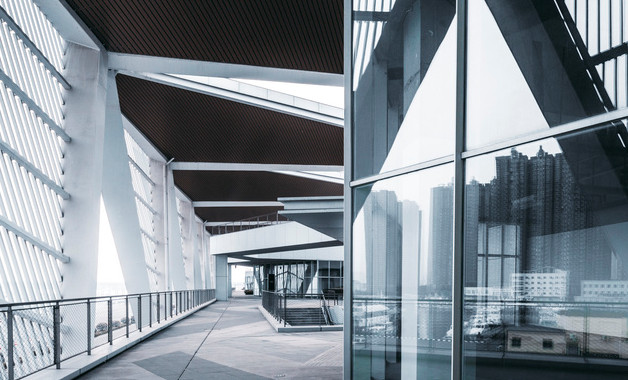- 目录

第1篇 岳麓书院的导游词范文
各位朋友:
大家好!欢迎大家来到千年学府--岳麓书院参观游览,很高兴能作为大家这次游览的导游,岳麓书院导游词。我们现在所处的这个位置就是岳麓书院的前门了。请大家抬头看,有一块“千年学府”的匾,为什么岳麓书院有“千年学府”之称呢?原来,岳麓书院从潭州太守朱洞创建于宋太祖开宝九年,也就是公元976年,距今已经有一千多年的历史了,所以有千年学府之称。它与江西白鹿洞书院、河南嵩阳书院及睢阳书院并称中国古代四大书院。好,接下来就让我们一起去感受一下千年学府浓厚的文化气息吧!
从岳麓书院的这幅平面图上,大家可以发现岳麓书院的古建筑在布局上所采用的是中轴对称、纵深多进的院落形式,其中讲堂是位于中轴线的中心,也是整个书院的中心位置。书院的建筑主要有三个部分的功能:讲学、藏书和祭祀。
这里是赫曦台,赫曦台是古时候酬神演戏的舞台。朱熹在岳麓书院讲学的时候,常常很早就爬起来跑到岳麓山顶去看日出,看到日出就拍手欢呼“赫曦、赫曦”,意思是红红的太阳升起来了,后来张栻就在这里修了一个台,取名“赫曦台”。
沿着中轴线,我们来到了岳麓书院的大门,大家请抬头看一下大门上面“岳麓书院”这块匾,是北宋第二个皇帝宋真宗御赐的。大家再看一下两边的对联:“惟楚有材,于斯为盛”。上联“惟楚有材”出自《左传》,下联“于斯为盛”出自《论语》。这一付对联也道出了岳麓书院作为天下最辉煌的英才荟萃之地的历史事实。
我们现在来到了讲堂。讲堂是讲学的中心场所,后来因为朱熹写了“忠孝廉节”四个大字所以又称“忠孝廉节堂”,导游词《岳麓书院导游词》。
讲堂内共有三块匾,分别是“实事求是”、“学达性天”和“道南正脉”。首先我们来看第一块匾:“实事求是”是民国初期湖南工专校长宾步程撰写的。青年时曾寓居学院的半学斋,“实事求是”对他的思想形成产生了重大的影响,在后来的革命实践中,他丰富和发展了“实事求是”的内涵,使“实事求是”成为思想的精髓。大家再看第二块匾:“学达性天”,这是康熙皇帝御赐的。“学达性天”是一种理学思想。这里的“性”指的是人性,“天”是指天道,程朱理学认为,人的善良本性是天道所赋,教育的目的是要恢复人的天命之性,达到天人合一的境界。皇帝所赐匾,意在勉励学子张扬理学,加强自身的修养,同时告诉人们在这里求学,可以获得德性修养,达到天人合一的学问的最高境界。最里面的这块“道南正脉”匾是乾隆皇帝为了表彰岳麓书院在传播理学方面的功绩所赐的,其意思是岳麓书院所传播的朱张湖湘学是理学向南传播后的正统。匾为原物,这里的“道”指的就是理学。说了这么多,大家可能会问,什么是理学呢?理学就是儒家学说发展到了宋代的一种称法。理学的开山鼻祖是我们湖南籍的一位叫周敦颐的老先生,而发展壮大理学思想的则是著名的程颐、程颢两兄弟。大家再往下看,讲堂的正中是一个高约1米的长方形讲堂,这是以前老师讲课的地方,上面摆着两把椅子是为了纪念张栻和朱熹这两位大师而设的。当年两位会讲的时候,盛况空前,从全国各地赶来听讲的人数达数千,可见当时朱、张两人名声之大。想想看,历史上多少名人如曾国藩、左宗棠、王夫之、魏源等等,当年他们就是坐在这底下听老师讲课的。
下面我们将参观书院做为藏书功能的部分-御书楼。这是书院里藏书的地方,相当于我们现在的图书馆,我们今天的游览也将要结束了,经过今天的参观,相信大家对岳麓书院这一千年学府的历史和文化已经有了一个大致的了解。谢谢大家!
第2篇 岳麓书院的英文导游词范文
good morning! ladies and gentlemen:
today we will go and visit the yuelu academy! yuelu academy is one of the four famous academies in china, and it was established by zhudong, magistrate of tanzhou prefecture in 976a.d at the time of northern song dynasty. the academy accepted disciples throughout the song, yuan, ming and qing dynasties. it was only in 1903 that the academy was transformed from a school of traditional confucian learning to an insitute of higher learning and in 1926 it was officially named hunan university.
early in 1015, emperor zhen zong of the song dynasty awarded the academy hid majesty’s own handwriting “yuelu academy” on a tablet. form then on many famous scholars and great thinkers gave lectures here, among them were zhangshi, zhuxi and wangyangming, thus making a great impact on the province’s culture and education. most of the existing buildings here were constructions of the ming and qing dynasties, and the bulk of the engraved stone plates and inscribed tablets have all been kept intact, in 1956 the academy was listed as a historical site at the provincial level and later, in 1988 it became a historical site at the state level. the last restoration project started in 1981 and the major part was completed in 1987.
now, here we are at the “he xi platform”, “he xi” means the “the splendour of the sunrise”, it was named by zhuxi, a great idealist philosopher of the confucian school during the song dynasty, the platform was first built on the top of yuelu hill, by zhanshi, and later in 1528, a pavilion was built on it, but it became deserted with the passing time. in 1790 luodian, the master of the academy, built a platform at the present site, in 1820, the succeeding master, ouyang houjun, renamed it “he xi platform” in order to memory zhuxi and zhanshi. it was restored in 1868.
on the inner walls of the platform are two big chinese characters “fu” and “shuo”, which mean “blessing” and “longevity” respectively. legend has it that the character “shuo ”was written with a broom soaked in yellow mud by a taoist master at the time master luodian was attending a banquet in honour of the examination officials and those dispels who had passed the civil exam hence it has been regarded as having “celestial touch” the character “fu” was written by luodian, the master himself.
this gate in front of us is the main gate, the gate was formerly built at the time of the song dynasty, and was then called “central gate”. the main gate underwent both destruction and reconstruction in the course of time. the present structure was once thoroughly renovated in 1868.
the characters “yuelu academy” on the horizontal tablet were inscribed by emperor zhen zong of the song dynasty. it was presented as an award to zhoushi, the master of the academy, when he was summoned to the emperor’s presence. on both door posts are couplets which read “the kingdom of chu, unique home of the talents, the academy of yuelu, the very cradle of all ”.it was composed in the qing dynasty by the master of the academy, yuan jiangang and his disciple zhang renjie.
this gate was the second gate, it was first built in 1527 during the ming dynasty. it underwent repairs and restoration many times .it was completely devastated during the anti-japanese war .in 1984, the gate was restored to its former state.
this is the lecture hall, where the students had lessons here, it was first built at the time of the song dynasty and was once named “jing yi hall”. now, it has a more elaborate name “the hall of the loyalty, filiality honesty and integrity”, because on the inner walls of the hall are engraved four big chinese characters:“ loyalty, filiality, honesty and integrity. they were handwriting by the great scholar, zhuxi, who once lectured here. others, such as the school regulations, the administrations and way to read were masterpieces of the masters of the academy. on the two horizontal tablets hanging on top were written:
“learn before you can probe the infiniteness of the universe.”
“the doctrines taught here in the south are genuine confucian doctrines.”
they were inscribed by the emperor kangxi and qianlong respectively during the qing dynasty.
the building in front of us is the yushu library, “yushu” literally means “imperial books”, so yushu library ,built in 999a.d in the early song dynasty, was a place to keep imperial books. books were continuously sent here during the succeeding dynasties. the library was first named “classics treasuring house” in the song dynasty, “classic venerating house” in the yuan and ming dynasties, and finally “yushu library” in the qing dynasty,. it had been repaired and expanded many times, and now it has a collection of over twenty thousand chinese classics. this building was rebuilt on its original site in 1986.
the two small pavilions xi quan and ni lan , built during the song and ming dynasties, were restored to the right and left of the compound galleries in order to display cultural relics.
第3篇 介绍长沙岳麓书院的导游词
1988年,岳麓书院建筑群被国务院批准为第三批国家重点文物保护单位,现为岳麓山风景区重要观光点,主体建筑有大门、二门、讲堂、半学斋、教学斋、百泉轩、御书楼、湘水校经堂、文庙等,各部分互相连接,完整地展现了中国古代建筑气势恢宏的壮阔景象。下面是小编为你带来的介绍长沙岳麓书院的导游词 ,欢迎阅读。
各位亲爱的同学们:
大家好!
欢迎大家来到风景优美的岳麓山参观举世闻名的岳麓书院。今天,由我“客串”书院导游,引领大家踏上这一非凡的文化书香之旅!
我们眼前的这块“风水宝地”便是古城长沙学术气息最浓郁的地方——岳麓书院。它是一座宁静优雅的庭院,有着千年波斓壮阔的历史,它的背后所蕴含的是一种大气、睿智,是一代又一代学子千年传承相继的文化梦想。庭前廊下、翘壁飞檐,那梦,是从唐代就一直延续下来的。怎么样,大家闭上眼,尽情地感受一下这里清冷的风的味道,是与其他地方截然不同的吧——那是有着千年不变浓浓的书香气息呢!
岳麓书院是一片古朴典雅的明清风格古建筑群,它坐落在风景名胜岳麓山清风峡口,静静地屹立在参天古木的掩映之下。它的每一进院落、每一方石碑、每一片砖瓦、每一扇雕窗,都暗藏着隽永的文化品味,是享誉中外的“千年学府”。它与江西白鹿洞书院、河南嵩阳书院、睢阳书院并称中国古代四大书院,是湖湘学派、宋明理学的发源地。现在,就让我们循着古圣先贤们的足迹走进书院这亘古不变的文化氛围中去吧!
大家现在看到的是岳麓书院的平面图:在布局上采用中轴对称、纵深多进的院落形式。主体建筑如头门、大门、二门、讲堂、御书楼集中于轴线上,讲堂布置在中轴线的中央,斋舍、祭祀专祠等排列于两旁。在书院的园林中,无论是小桥流水、假山回廊,都与讲堂构成了一副浑然天成的画面。儒道互补,庄重典雅,这正是岳麓书院传承千载的精神佳境。
经过悬挂“千年学府”匾的头门就是赫曦台,内壁两侧墙上各有一个金色大字——“福”与“寿”如龙腾虎跃,遥相呼应。
沿着中轴线,我们便来到了书院的大门。正上方悬挂宋真宗“岳麓书院”御匾,“惟楚有材于斯为盛”这一千古名联很霸气地挂在大门上,道出了岳麓书院作为天下最辉煌的英材荟萃之地的历史事实。大门两旁安放的一对汉白玉抱鼓石双面浮雕,是一件珍贵的艺术品。
现在,请大家移步,摆放着两把红木雕花座椅的地方便是“讲堂”了。讲堂是书院的核心部分,位于书院的中心位置。讲堂正中设高约一米的长方形讲坛,为古代老师授课的地方,上面摆两把红木雕花座椅,是为了纪念张栻和朱熹这两位大师论讲于坛上而设,表示两位大师平起平坐、不分秋色。讲台之后有木质屏风,上面嵌刻山长张栻撰写的《岳麓书院记》,该文内容实为古代岳麓书院培养人才的指导思想。
坎堂两璧嵌“忠、孝、廉、节”四字石刻,据传系朱熹手书。这四字实际上正是岳麓书院在整个封建社会的校训。在讲堂正面两侧壁上,还有四块碑“整、齐、严、肃”,与“忠、孝、廉、杰”碑相映衬,书院灵魂的脉络始终清晰明了。
岳麓书院不仅有读书讲学之所,还有一处三层建筑,那便是“御书楼”。御书楼“藏”在讲堂屏壁之后,现藏书已达6万多册,现在是湖南大学的古籍图书馆。
岳麓书院的楼阁砖瓦闪耀着千年凝聚的智慧,带给我们的远不止视觉与心灵上的震撼,这千年传承下来的文化传奇更会影响指引我们的一生!
欣赏完这几进深深的庭院,今天我们的游览也接近尾声。感谢同学们的配合,期待下一次的交流!谢谢!









